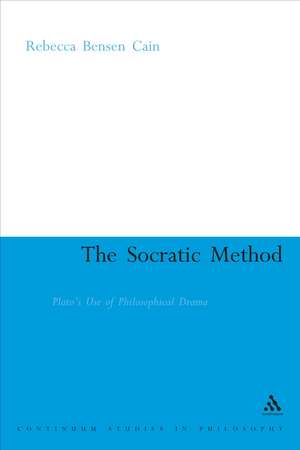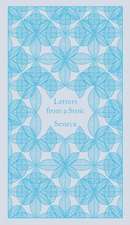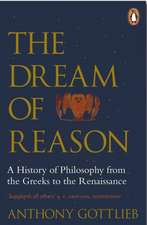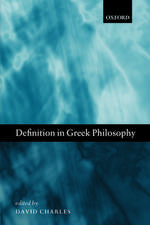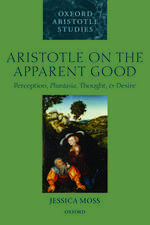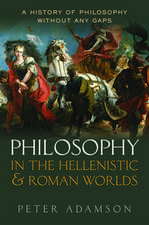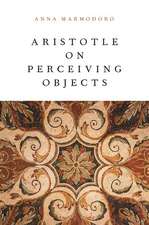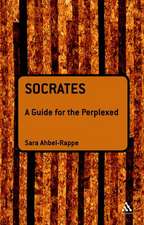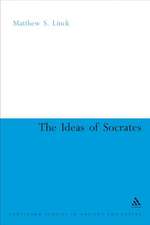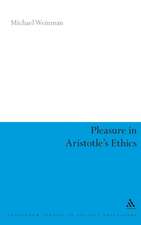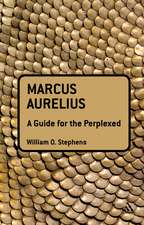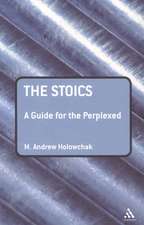The Socratic Method: Plato's Use of Philosophical Drama: Continuum Studies in Ancient Philosophy
Autor Rebecca Bensen Cainen Limba Engleză Hardback – 25 feb 2007
Din seria Continuum Studies in Ancient Philosophy
- 22%
 Preț: 256.59 lei
Preț: 256.59 lei - 22%
 Preț: 1005.41 lei
Preț: 1005.41 lei - 22%
 Preț: 883.86 lei
Preț: 883.86 lei - 22%
 Preț: 897.55 lei
Preț: 897.55 lei - 23%
 Preț: 236.19 lei
Preț: 236.19 lei - 22%
 Preț: 888.81 lei
Preț: 888.81 lei - 31%
 Preț: 949.08 lei
Preț: 949.08 lei - 31%
 Preț: 891.18 lei
Preț: 891.18 lei - 22%
 Preț: 947.11 lei
Preț: 947.11 lei - 23%
 Preț: 255.19 lei
Preț: 255.19 lei -
 Preț: 255.66 lei
Preț: 255.66 lei - 22%
 Preț: 889.88 lei
Preț: 889.88 lei -
 Preț: 255.11 lei
Preț: 255.11 lei -
 Preț: 256.38 lei
Preț: 256.38 lei -
 Preț: 256.02 lei
Preț: 256.02 lei -
 Preț: 256.85 lei
Preț: 256.85 lei -
 Preț: 255.66 lei
Preț: 255.66 lei -
 Preț: 255.66 lei
Preț: 255.66 lei - 14%
 Preț: 889.97 lei
Preț: 889.97 lei -
 Preț: 257.12 lei
Preț: 257.12 lei
Preț: 946.72 lei
Preț vechi: 1100.84 lei
-14% Nou
Puncte Express: 1420
Preț estimativ în valută:
181.16€ • 189.53$ • 150.49£
181.16€ • 189.53$ • 150.49£
Carte tipărită la comandă
Livrare economică 03-17 aprilie
Preluare comenzi: 021 569.72.76
Specificații
ISBN-13: 9780826488916
ISBN-10: 0826488919
Pagini: 148
Dimensiuni: 156 x 234 x 18 mm
Greutate: 0.39 kg
Editura: Bloomsbury Publishing
Colecția Continuum
Seria Continuum Studies in Ancient Philosophy
Locul publicării:London, United Kingdom
ISBN-10: 0826488919
Pagini: 148
Dimensiuni: 156 x 234 x 18 mm
Greutate: 0.39 kg
Editura: Bloomsbury Publishing
Colecția Continuum
Seria Continuum Studies in Ancient Philosophy
Locul publicării:London, United Kingdom
Caracteristici
Of great interest to those working in ancient philosophy and classics
Cuprins
Introduction
1. A Psychological Model of Socratic Method
(a) Vlastos's Account of the Elenchos
(b) A new constructive approach to the Socratic moral position
2. The Protreptic Function and the Use of Ambiguity
(a) The Protreptic Function
(b) Socrates' Use of Ambiguity
3. Socratic Method and the Use of Ambiguity
(a) The Use of Ambiguity in a Dialectical Context
(b) Socrates and the Sophists: A Comparative Analysis
4. In Defence of Socrates' Use of Ambiguity
(a) Irony and its Socratic Uses
(b) Defending Socrates' Use of Ambiguity
5. Socratic Method and Self-Knowledge
Bibliography
Index
1. A Psychological Model of Socratic Method
(a) Vlastos's Account of the Elenchos
(b) A new constructive approach to the Socratic moral position
2. The Protreptic Function and the Use of Ambiguity
(a) The Protreptic Function
(b) Socrates' Use of Ambiguity
3. Socratic Method and the Use of Ambiguity
(a) The Use of Ambiguity in a Dialectical Context
(b) Socrates and the Sophists: A Comparative Analysis
4. In Defence of Socrates' Use of Ambiguity
(a) Irony and its Socratic Uses
(b) Defending Socrates' Use of Ambiguity
5. Socratic Method and Self-Knowledge
Bibliography
Index
Recenzii
"There are several laudable features of the book. Unlike much scholarship on Socrates' method, C seeks to recognize the significance of Plato's literary art and to distinguish what Socrates tries to accomplish within a dialogue from what Plato tries to accomplish by having him do so. Unlike that scholarship, too, she aims to look at whole dialogues rather than only parts and to interpret them in a more contextual way (5), by seeing the arguments 'within the framework of the drama' (51). And she recognizes that there is a 'complex psycho-dynamics' (4) at work in Socrates' treatment of his interlocutors...The greatest strength of the book...is the careful analyses of particular cases (68-93), of which there could well be more. They show more clearly than any number of argument summaries that and how Plato's Socrates plays on the ambiguity of central terms in these premises and employs psychological strategies to detach his interlocutors from the conventional or sophistic views they bring to the conversation and to re-orient them towards a more Socratic set of beliefs, values, and practices." -Gerald A. Press, Philosophy in Review, 2007
'Readers will be challenged and intrigued by Cain's treatment...' Voula Tsouna, University of California, Santa Barbara
'I enthusiastically recommend this book and look forward eagerly to having a copy on my own bookshelf to consult in my own work.' Nicholas D. Smith, Lewis & Clark College, Portland, OR
'Readers will be challenged and intrigued by Cain's treatment...' Voula Tsouna, University of California, Santa Barbara
'I enthusiastically recommend this book and look forward eagerly to having a copy on my own bookshelf to consult in my own work.' Nicholas D. Smith, Lewis & Clark College, Portland, OR
